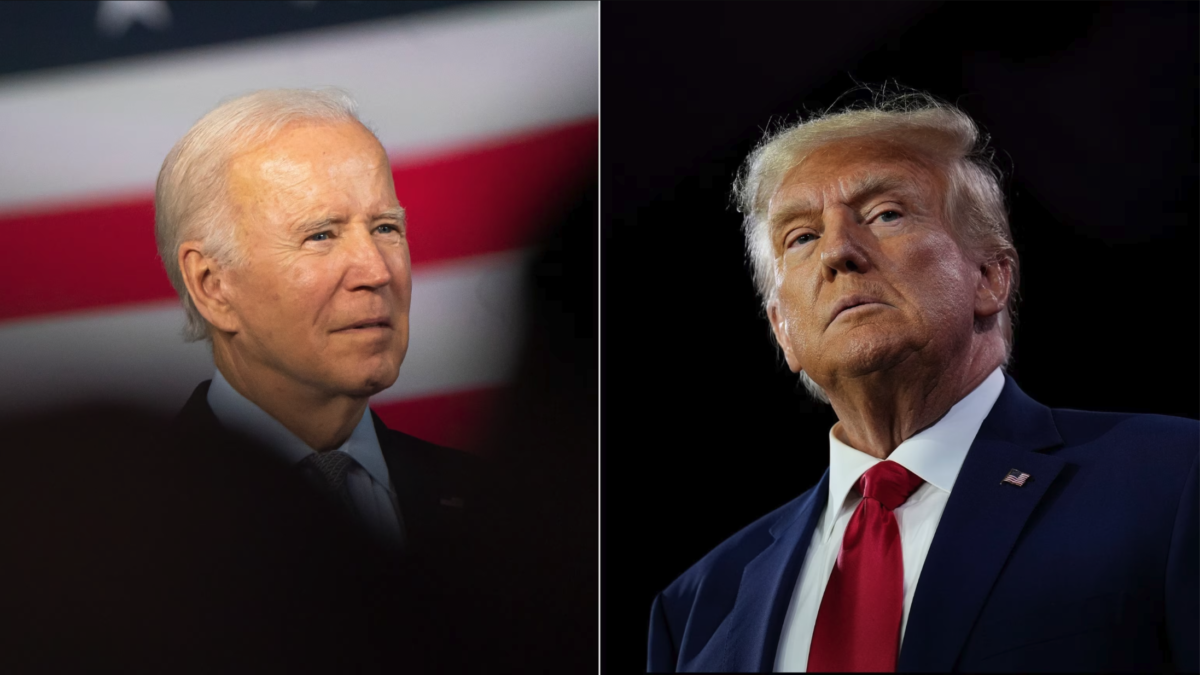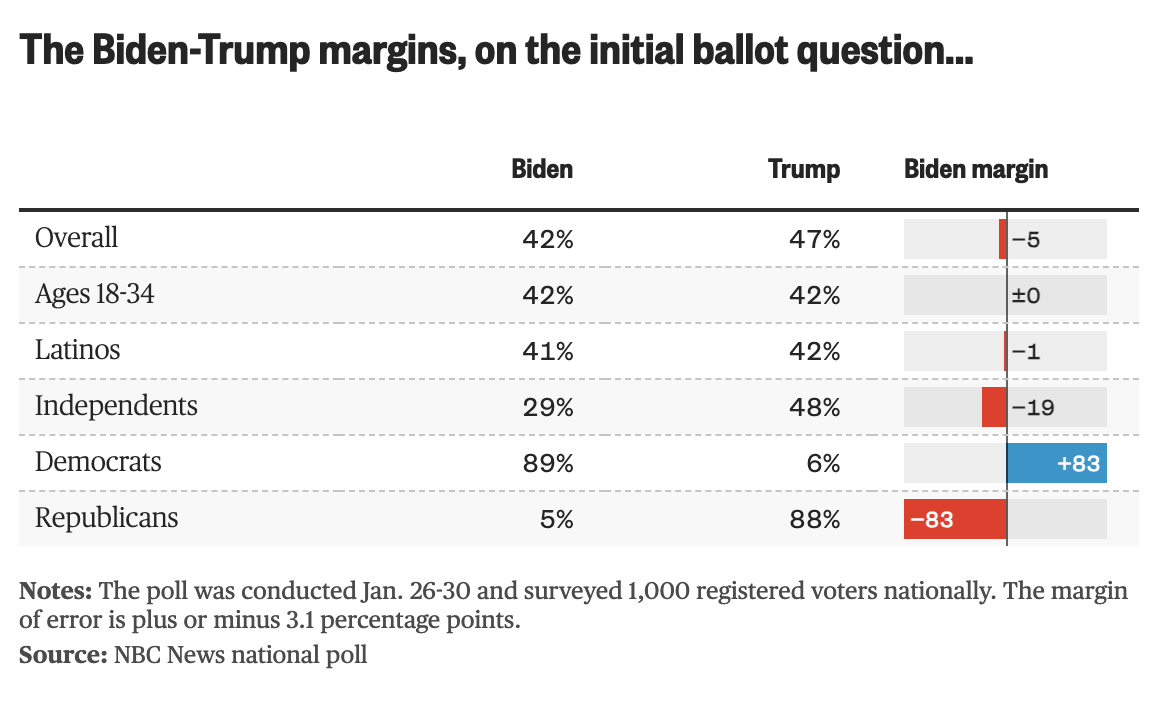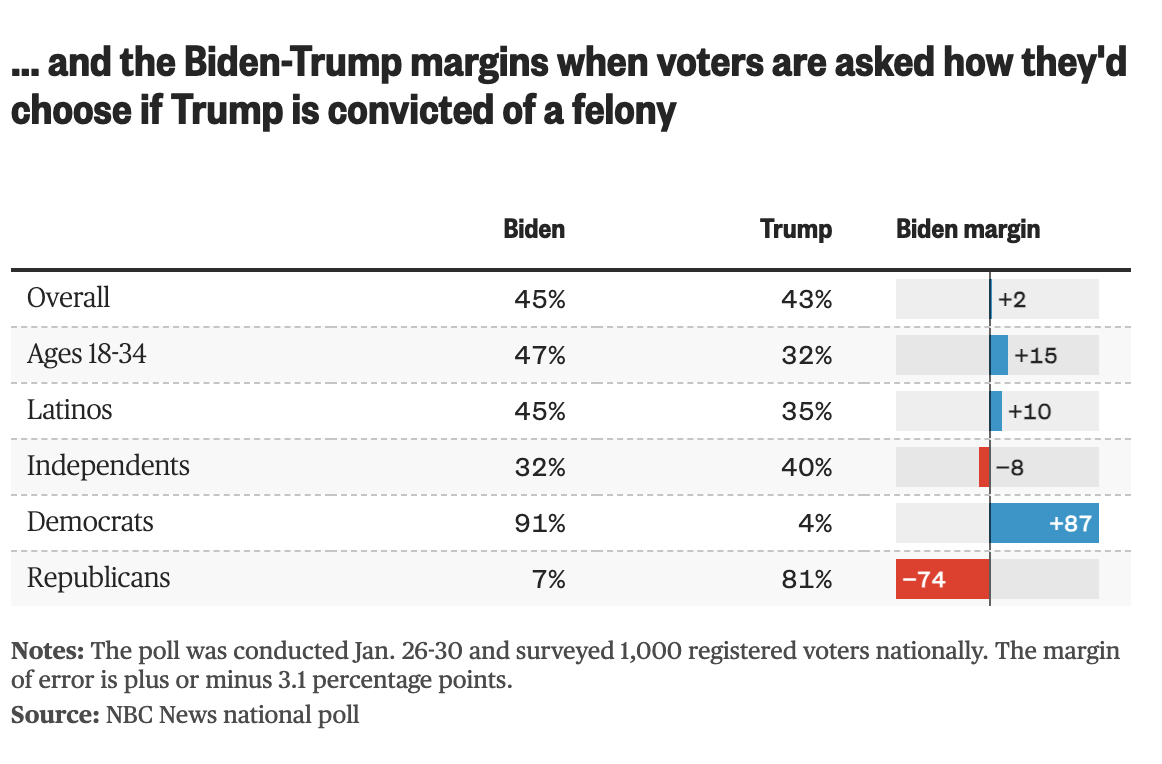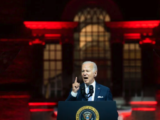But Biden Leads Trump by Two if He’s Convicted of a Felony –
By Glynn Wilson –
Public Opinion Analyst –
WASHINGTON, D.C. — Break time is over. It’s time to get to work on the elections of 2024, now less than 10 months away on Tuesday, Nov. 5.
A new public opinion poll by NBC News shows former President Donald Trump leading President Joe Biden by five percentage points among registered voters, 47 to 42 percent, in a hypothetical general-election matchup. This is concerning because it is outside the margin of error of 3.1 percent.
The good news is when pollsters ask how voters would vote if Trump is convicted of a felony, Biden narrowly pulls ahead of Trump by two points, 45 to 43 percent.
In looking at the demographic breakdowns in the survey, some of the most pronounced shifts come among voters who backed Biden strongly in 2020 who now say they may not support him in 2024 — younger voters, Latinos and independents.
On the original ballot, Biden and Trump are tied 42 to 42 percent among voters between the ages of 18 to 34. But when these voters are asked about their ballot choice if Trump is convicted, they break for Biden by 15 points, 47 to 32 percent.
Similarly, 42 percent of Latinos who say they now support Trump would shift to support Biden by 45 percent, and only 35 percent would support him if he’s convicted.
Independents shift from a 19-point lead for Trump on the first ballot to a smaller, 8-point edge for Trump on the second.
“Especially among independents, it’s a dramatic shift,” NBC says. “But it’s always unclear how a hypothetical will play out in real life.”
It’s also still very early, and Trump has not yet completely locked up the Republican nomination, although it’s looking more and more likely that he will be the nominee.
The NBC News poll was conducted Jan. 26-30 of 1,000 registered voters — 867 contacted via cellphone — and it has an overall margin of error of plus or minus 3.1 percentage points.
Trump Trials
These results show how important it is for all the criminal trials of Trump to take place this year and not be delayed until after the next election. But there are some serious complications underway in the courts.
Just this week, the federal judge overseeing Trump’s prosecution on charges of plotting to overturn the 2020 election issued an order on Friday scrapping the March 4 trial date for the case.
NYT: Judge Scraps Trial Date for Trump Election Subversion Case
“The order by Judge Tanya S. Chutkan was a formal confirmation of what had seemed fairly obvious for weeks,” the New York Times reports. “It came after she had made a series of hints that she was going to delay the trial as Mr. Trump pursues an effort to have the underlying charges tossed out with an argument that he enjoys complete immunity from prosecution.”
Judge Chutkan said she would set a new date for the proceeding in Federal District Court in Washington “if and when†Trump’s immunity claims are resolved.
That question is now in front of a three-judge panel of the United States Court of Appeals for the District of Columbia Circuit, which has been considering the issue since oral arguments took place on Jan. 9. The panel expressed skepticism about Trump’s position, but it is yet to return a decision after setting an extremely aggressive schedule for briefings to be filed.
“Judge Chutkan’s decision to delay the trial was the latest twist in an ongoing and often bitter struggle between Mr. Trump’s lawyers and prosecutors working for the special counsel, Jack Smith, over the timing of the proceeding,” the Times reports. “Mr. Trump’s legal team has used every lever at its disposal to push the start of the trial until after this fall’s election is decided.”
If that were to come about and Trump wins in November, he has already indicated he would order his attorney general to dismiss the charges. Even if the indictment was not dismissed, the case could be frozen for as long as he is in office under a longstanding Justice Department policy against prosecuting a sitting president.
Worried about charges of a political prosecution from Republicans, prosecutors have never explicitly said they want to hold the trial before the election to avoid such potential consequences, according to the Times. They’ve framed their efforts to move the case quickly toward trial “as a nod toward the enormous public interest in seeing the former president’s case resolved in a speedy fashion.”
That’s the right position to take, especially if you ever expect to restore the independence of the judiciary from partisan politics, something the Republicans have shown no interest in doing. They scream that the other side is engaged in a political prosecution, when in fact, the Republicans have been using the courts for political advantage for decades. The Bush Justice Department under political influence by Vice President Dick Cheney and the political maneuverings of Karl Rove explicitly used the Justice Department to put political rivals on trial, including former Alabama Governor Don Siegelman.
I know because I covered this case from start to finish for five years of my life.
The Nation: A Whistleblower’s Tale
Confusion
In a move that has confused both the public and some journalists and legal experts, Special Counsel Jack Smith, who was appointed by Attorney General Merrick Garland to handle the case, tried to bypass the appeals court and asked the U.S. Supreme Court to take up the overarching and dangerous issue of presidential immunity. The high court declined.
In an attempt to understand this move and where the case stands, I emailed some legal experts for comment. This is how it was explained to me off the record by one attorney and former Senator.
Trump filed a motion to dismiss the charges in the insurrection trial claiming absolute immunity. The judge in that case denied the motion, which should have been the end of it. Trump was scheduled to stand trial beginning March 4.
Trump’s lawyers appealed the ruling on that motion to the D.C. court of appeals, where the case is stuck. Arguments were heard Jan 9, but there’s no decision yet.
Smith filed with the Supreme Court to try to by-pass the court of appeals and speed things up, but the high court denied the motion to hear the case, sending it back to the appeals court.
“Smith has been consistently moving the process along as fast as he can,” my source said.
After the former president asked the appeals court to step in and reverse Judge Chutkan’s ruling, she put all of the proceedings in the underlying case on hold until the issue was settled.
The decision to strike the March 4 date means that Trump’s trial on state charges in New York of helping to arrange hush payments to a porn star in the run-up to the 2016 election may now become the first of the former president’s four criminal cases to go in front of a jury, the Times reports in its analysis. That trial, scheduled to start in Manhattan on March 25, has been slowly moving forward. The Manhattan district attorney’s office has begun to approach witnesses to prepare them for the proceeding, including Michael Cohen, Trump’s former “fixer.”
“It is not entirely certain that the hush money trial in New York will start before the election subversion trial in Washington,” according to the Times.
Justice Juan Merchan, who is overseeing the hush money case, has set a hearing for Feb. 15 to determine the timing of that trial.
If Trump’s appeal of the immunity issue is resolved quickly and the appeals court rules that he does not have a special immunity as a former president, and the Supreme Court refuses to take up the case or rules in agreement in an expedited fashion, Judge Chutkan could set a new trial date in Washington for late April or early May.
What could and probably should happen is that language is developed by the appeals court panel outlining why a former president does not have immunity from the laws of the land — that no one is above the law. The D.C. court has a more liberal reputation than some courts. Trump did put a dent in that when he was in office pushing through judges with some help from the Senate in confirmations, so it is hard to speculate on how that will all play out.
It’s possible that Justice Merchan could step aside and let the election subversion trial go first.
“The Supreme Court is likely to play the decisive role in determining the timing of both trials,” the Times reports.
If the justices decline to hear the immunity case and uphold the appeals court ruling, the matter will immediately return to Judge Chutkan, who has shown an inclination to move quickly.
If the justices take the appeal and hear and decide it on an expedited basis, the election case could go to trial this summer. But if the court pursues a leisurely pace in considering the question of immunity, Judge Chutkan might not be able to schedule it before Election Day, especially given the complexities of putting Trump on trial in the heat of the general election season.
Dog helps us all and pray for justice.
___
Glynn Wilson is an expert on public opinion as an academic researcher and a journalist. He minored in Political Science with a major in Journalism and Communications at the University of Alabama in an undergraduate BA program back in the early 1980s, where he took every class offered related to this specialty. He also spent some time working with the Capstone Poll in those days, run by Political Science Professor Pat Cotter, and journalism professor Jim Stovall. He covered public opinion for newspapers after that for 10 years as part of the beat of covering public affairs and politics, including elections. He then went back to grad school at UA in the mid-1990s. One of his graduate research jobs was to oversee the public opinion lab in the College of Communications, also under the leadership of Stovall and Cotter, who conducted most of the political election polls in Alabama for a couple of decades. Wilson’s academic research specialty was in the area of media effects on public opinion. He later worked toward a Ph.D. in this research, but rather than continue teaching and jump through the final hoop of defending a dissertation at the University of Tennessee, he opted to go back into the news business working for The Dallas Morning News, The New York Times and other publications. He went independent on the web in 2005, and has covered public opinion ever since as one of his many specialty beats.
___
If you support truth in reporting with no paywall, and fearless writing with no popup ads or sponsored content, consider making a contribution today with GoFundMe or Patreon or PayPal. We just tell it like it is, no sensational clickbait or pretentious BS.
















